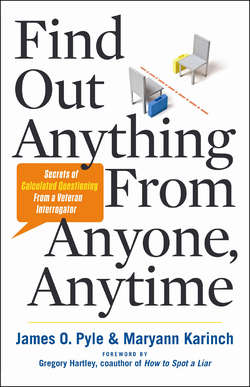Читать книгу Find Out Anything From Anyone, Anytime: Secrets of Calculated Questioning From a Veteran Interrogator - Pyle James - Страница 4
Preface
ОглавлениеMy brother and I became interested in cars at an early age. One day, we asked our dad if he would lift up the hood so we could see what was underneath it. He grumbled a bit, but he did, and then he went back into the house. Seeing what was under the hood didn’t quite satisfy us, so we started removing pieces from the car. By the time my dad discovered us, we had pulled the intake manifold off, disconnected the exhaust manifold, and broken the bolts so we could see inside the engine.
We were in so much trouble.
The positive spin on this is that we were intent on discovery, not destruction. Questioning is about discovery, and the process I’ve developed and taught Department of Defense students will give you the tools you need to extract all of the components from under the hood and get all the way to the pistons. You will be shocked at the depth of knowledge you will discover – if you want it – about your customers, job applicants, colleagues, vendors, and friends, as well as perfect strangers and criminals.
The first step in learning good questioning skills is grasping the true power of a question. For example, I was in line at the post office last Christmas season when a woman came in with her arms full of packages. “Wow!” I said to her, “How many friends do you have?” She volunteered that all of packages were for her daughter (and her family), who had dropped out of college to have children. She then went on to tell me how displeased she was about that choice. She and her husband had even asked the daughter to pay back the money they’d invested in her “lost” two years of college. All I did was ask a question and I got a peek under the hood at this woman’s emotional engine compartment.
Placing value on questions means that, to some extent, you adopt the mentality of my students: “Interrogation never stops.” In other words, the person you’re posing questions to may think that the conversation has moved on past the job interview, for example, but you are still listening to every answer and discovering relevant things about the person. You may no longer be asking questions related to work history or education, but your question, “What do you think of this weather?” might lead to the knowledge that the applicant has panic attacks when she has to drive in the rain.
The secret to finding out anything you want to know is simply to ask good questions. Most people trip through life asking bad questions – of teachers, friends, coworkers, clients, prospects, experts, and suspects. Even people trained in questioning, such as journalists and lawyers, commonly ask questions that get partial or misleading answers. People in any profession will find immediate benefits in developing the skill and art of good questioning.
In this book, Maryann and I will explore:
✗ What’s so hard about asking a good question? You’ve been asking questions since you could talk. The problem is that the more knowledge you acquired and the more sophisticated your vocabulary became, the worse you probably got at asking questions.
✗ Changing the way you think. The structure and flow of effective questions probably won’t come naturally to you. You’ll need to rewire your brain a bit, to become a little more like Socrates.
✗ Structuring a good question. Effective questioning is about accuracy and efficiency, and the way that most people structure questions on a day-to-day basis is about neither one.
✗ Using different types of questions to your advantage and knowing the difference between a good question and a bad question.
✗ Identifying discovery areas and knowing how to stick with a line of questioning that tells you all you need to know about a person, place, thing, or event in time.
✗ Honing the essential skills of listening and note-taking.
✗ Analyzing the answers you get to determine if you need more information or if the information you’ve been given is flawed or untrue.
✗ Using effective questioning to enable you to gain measurable advantages in your professional life and to gain real expertise fast.
When I was part of the interrogation world, I was known mostly as a questioning instructor and a strategic debriefer – meaning that the people around me expected me to be the best at asking questions and getting answers. I’ve been training other interrogators in questioning techniques since 1989. You are now the students who can exploit the questioning skills of our best interrogators and use them to your advantage in your profession.
I encourage you to see questioning as a handshake. Asking questions is an invitation to a relationship. Rather than being an aggressive or intrusive exercise – which is how some might view it – I see it as a process that enables you to connect with other people and what they want to share.
